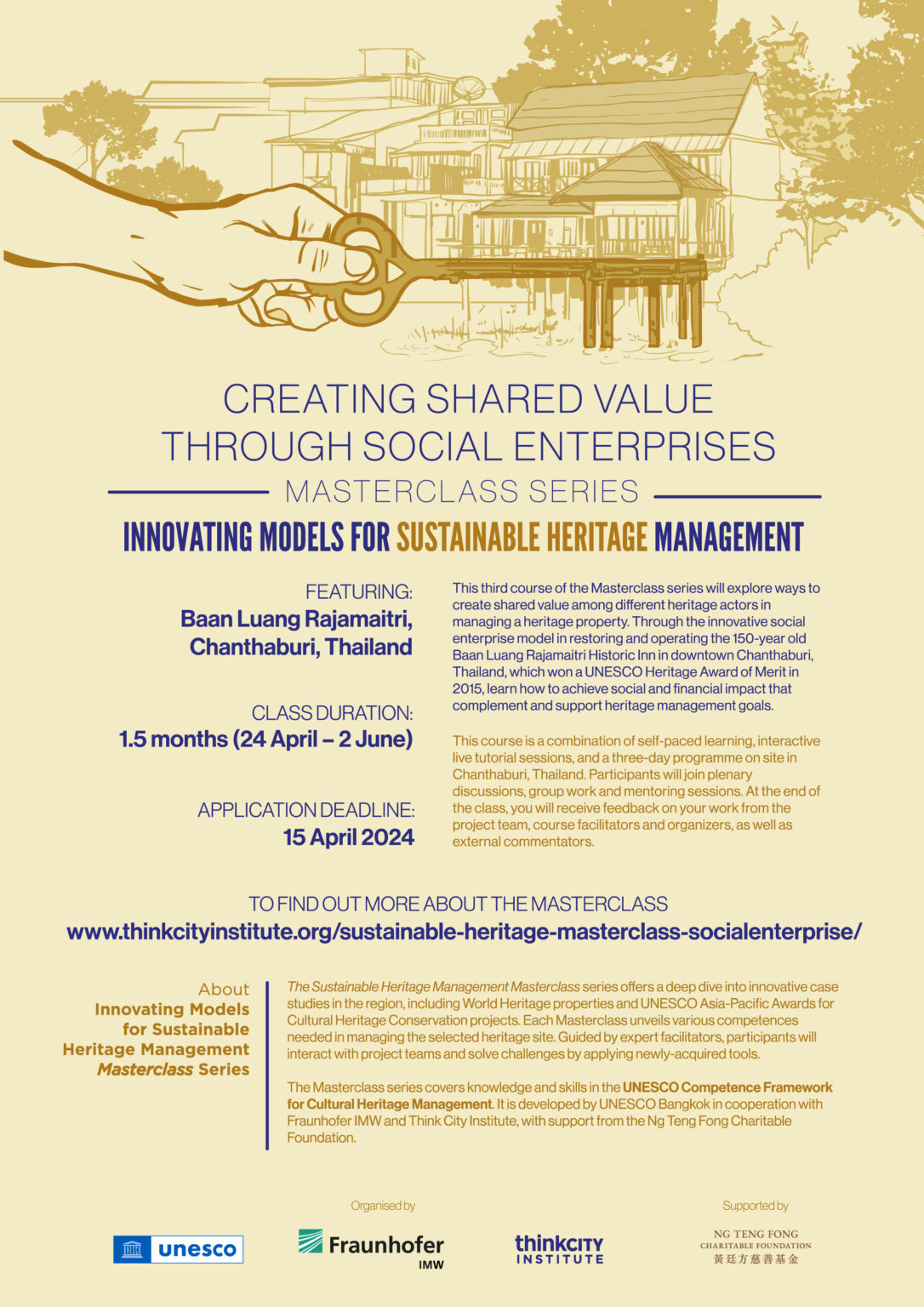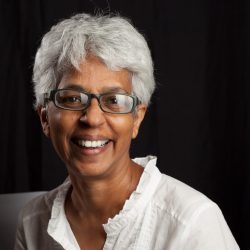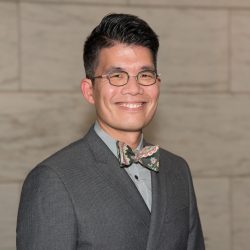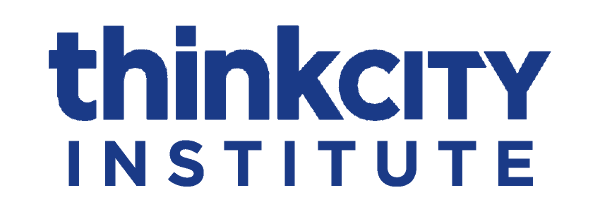INNOVATING MODELS FOR
SUSTAINABLE HERITAGE
MANAGEMENT
MASTERCLASS SERIES

Overview
What is success in heritage management? State-of-the-art conservation of a historic property? Reviving a long-lost traditional practice? Increasing the number of visitors to the site? Restoring local ecology and landscape? Improving local well-being? Even before the global pandemic, there has been a push for the heritage sector to expand its boundaries and rethink its priorities.
Sustainable heritage management is no longer just about conserving heritage values, but also about creating new value through innovative business and governance models.
The Sustainable Heritage Management Masterclass series offers a deep dive into innovative case studies in the region, including World Heritage properties and UNESCO Asia-Pacific Awards for Cultural Heritage Conservation projects. Each Masterclass unveils various competences needed in managing the selected heritage site. Guided by expert facilitators, participants will interact with project teams and solve challenges by applying newly-acquired tools.
The Masterclass series covers knowledge and skills in the UNESCO Competence Framework for Cultural Heritage Management. It is developed by UNESCO Bangkok in cooperation with Fraunhofer IMW and Think City Institute, with support from the Ng Teng Fong Charitable Foundation.
Featuring: Baan Luang Rajamaitri, Chanthaburi, Thailand
The third course in the Masterclass series will explore the ways to create shared value among different heritage actors in managing a heritage property. It will introduce the innovative social enterprise model in restoring and operating the 150-year old Baan Luang Rajamatri historic inn in downtown Chanthaburi, Thailand, which won a UNESCO Heritage Award of Merit in 2015. Explore ways to achieve social and financial impact that complement and support heritage management goals.
Course Objective
Participants will learn how to mobilize social enterprise tools and processes to create a sense of ownership and generate benefits for various stakeholders in the sustainable management of a heritage property.
Learning Outcomes
By the end of this course, participants should be able to:
- Develop proposals for delivering better value for stakeholders in managing a heritage property using social enterprise tools and processes
- Acquire new competences (skills and knowledge) relevant to cultural heritage management, with a focus on the managerial competences defined by UNESCO (such as organizational governance/heritage planning/strategic management, human capital management, financial management, communication/collaboration/coordination)
- Apply analytic thinking and problem-solving tools in a heritage management context
Learning Experience
This course is a combination of self-paced learning, interactive live tutorial sessions, and a three-day programme on site in Chanthaburi, Thailand. Participants will join plenary discussions, group work and mentoring sessions. At the end of the class, you will receive feedback on your work from the project team, course facilitators and organizers, as well as external commentators.
There will be a total of six sessions as below, spread over a 2-month period, with interim time between the sessions for self-paced learning and individual projects.
| TUTORIAL SESSIONS | |||||
|---|---|---|---|---|---|
| Orientation session | Session 1 | Session 2 | Onsite Programme | Finale Session | |
|
|
|
|
|
|
Note: the course arrangements are subject to further update
*Tentative dates for online/onsite activities:
- Orientation Session (Online): 24 April
- Session 1 (Online): 28 April (8 am – 11 am Bangkok time)
- Session 2 (Online): 12 May (8 am – 11 am Bangkok time)
- Onsite Programme in Chanthaburi, Thailand: 17-18-19 May 2024
- All participants are required to be onsite in Chanthaburi, Thailand during these three days. A shuttle will be organized from Bangkok to Chanthaburi in the morning of 17 May and from Chanthaburi to Bangkok on 19 May afternoon. Participants are expected to organize their own travels, including transportation to/from Bangkok, and accommodations in Chanthaburi.
- Finale Session (Online): 2 June (8 am – 11 am Bangkok time
Class Resources
Case study
Participants will gain access to the Baan Luang Rajamaitri Case Study that was specifically developed for this Masterclass. The case study will walk you through the story of the restoration of Baan Luang Rajamaitri, a former aristocratic home in the heart of Chanthaburi town, ending with a management challenge faced by the project team. You will learn about the property’s heritage significance, its historical and cultural setting, stakeholders involved, key decision points and social engagement strategies that were developed. Participants will work in teams to respond to the challenge by using newly-acquired knowledge and skills from the course in combination with your own experience.
Course handbook
The course handbook will provide a guide to how the class will be organized. It will detail the session contents, schedule, group work/assignments and discussion topics for the class.
Self-paced learning on the case and management topics
You will learn more about the case through a number of newly-produced videos for this Masterclass by the project team.
In addition, you will be provided a curated list of publications and videos in relation to cultural heritage management with a focus on the managerial skills and knowledge that are relevant to the case. This will include teaching videos about and tools that can support PPP initiatives.
ABOUT THE COURSE FACILITATORS

Janet Pillai
Janet Pillai is an independent consultant and resource person advocating for cultural sustainability through education, capacity building and community based projects. She previously served as associate professor at the Department of Performing Arts in University Sains Malaysia (until 2013) and as adjunct Associate Professor at The University of Hong Kong, Division of Architectural Programs (until 2022). Her field of specialization includes cultural heritage education, cultural mapping and programming of community-engaged arts projects in partnership with local agencies, institutions, and professionals. Pillai has researched and published widely on community-based arts in the Asian region, cultural mapping and has authored 5 books related to arts, culture and heritage education. Pillai also contributes as an expert resource person to regional institutions such as UNESCO Bangkok and APCIEU Korea and Hong Kong University.

Teng Chamchumrus
Teng Chamchumrus is an applied strategist with more than 20 years of experience in the nonprofit and the private sectors. He has a BA in economics (magna cum laude) and an MBA from Harvard University. He served as Executive Officer, at the Smithsonian Institution, where he provided strategic thinking, leadership and management expertise in planning and implementation of education and audience engagement initiatives. Prior to the Smithsonian, Teng held various management and leadership roles at the American Red Cross, including leading the financial planning and analysis function for major disaster relief operations including Hurricane Katrina. Internationally, he served on the board of the International Council of Museums – United States (ICOM-US) and is an active member of the ICOM International Committee for the Collections and Activities of Museums of Cities (CAMOC). Locally, he served on the board of Montgomery History, Montgomery County, Maryland, USA. As a Fulbright Specialist, Teng provided strategic advisory services to the Kosovo Council for Cultural Heritage.
Teng is interested in museums’ roles in serving communities and the intersection of economic development, cultural sustainability, and sustainable communities. Teng is committed to bring his professional expertise and experience to help keep communities vibrant and diverse for generations to come.
ORGANIZERS
UNESCO
UNESCO is the United Nations Educational, Scientific and Cultural Organization, established to promote peace via education, science and culture. As the only UN agency mandated to promoting culture, UNESCO’s programmes recognizes culture as a driver for sustainable development, and contribute to the achievement of the Sustainable Development Goals defined in Agenda 2030, adopted by the UN General Assembly in 2015.
Fraunhofer IMW
Since its foundation in 2005, the Fraunhofer Center for International Management and Knowledge Economy IMW has been consolidating its expertise and range of services in internationalization and the knowledge economy. The Fraunhofer IMW aims to enable a favorable environment for innovation and knowledge transfer by developing scientifically sound solutions to challenges presented by globalization and ensuring the lasting success of its clients and partners from business and industry, research, and civil society.
Think City Institute
The Think City Institute (TCI) is the culmination of a decade of know-how, experimentation and expertise derived from Think City’s projects and knowledge networks in ASEAN and beyond. TCI will offer resources from our Knowledge Repository, and courses, built inhouse and with our international partners, to all levels of professionals looking to elevate proficiencies in city-making and urban development.
WHO SHOULD APPLY FOR THIS CLASS?
Heritage practitioners who are looking to improve skills and knowledge about heritage management in a practical manner will benefit most from this course.
- Heritage managers and technical specialists in heritage-related institutions
- Government entities that are involved in management of heritage properties
- Private entities interested/involved in heritage projects and business opportunities
- Local stewards and community actors at heritage sites
The course requires no formal education in cultural heritage management, but working experience in the heritage field will be valued. Professionals in other fields who are currently involved in heritage projects will also benefit from this course.
WHAT WILL THIS CLASS DO FOR YOU?
Participants will:
- Learn new skills and knowledge from UNESCO’s Competence Framework using the case method to dissect the success factors of an innovative heritage management case study.
- Improve networking through interactions with the project teams, facilitators, resource people and fellow participants from a range of disciplines and countries around the Asia-Pacific region.
CERTIFICATE
Participants will receive a certificate to acknowledge successful completion of this class, subject to full attendance of the course sessions and submission of the required assignments.
ADMISSION & FEES
FEES
Course participants will be chosen through an application process. You will be directed to the payment process by the organizers upon successful acceptance to the Masterclass.
Course fee: USD350
- The course fee includes the roundtrip bus transfer from/to Bangkok to/from Chanthaburi, 1 dinner (17 May), 2 lunch (18 May, 19 May) during the on-site programme.
- Individual participants will be responsible for their hotel accommodation, transportation, meals and other personal expenses.
- Limited scholarships are available. This scholarship will exempt the course fee, but not the travel expenses for the onsite programme in Thailand. Priority will be given for applicants from LDCs in the Asia-Pacific region.
APPLICATIONS
APPLY NOW by downloading the application form here.
- Application deadline: 15 April 2024
- Selected participants will be informed by 17 April 2024 via email.
Please submit your online application by 15 April 2024. For any inquiries regarding the course, please contact Injee Kim at UNESCO Bangkok (i.kim@unesco.org).
Supported by


